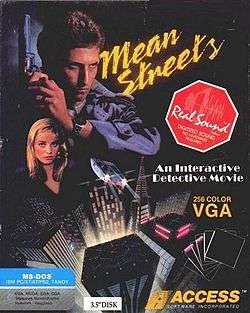Mean Streets (video game)
| Mean Streets | |
|---|---|
 DOS Cover art | |
| Developer(s) |
Access Software The Code Monkeys (AMI) |
| Publisher(s) |
Access Software U.S. Gold (ST & AMI) |
| Director(s) | Bruce Carver |
| Producer(s) | Bruce Carver |
| Designer(s) |
Roger Carver David Curtin Brent Erickson Kevin Homer |
| Artist(s) |
Douglas Vandegrift John Berven Jon Clark |
| Writer(s) |
Brent Erickson Brian Ferguson Chris Jones |
| Series | Tex Murphy |
| Platform(s) | MS-DOS, Commodore 64, Atari ST, Amiga |
| Release date(s) |
MS-DOS & Commodore 64 Atari ST & Amiga
|
| Genre(s) | Adventure |
| Mode(s) | Single-player |
Mean Streets is a graphic adventure game developed and published by Access Software for MS-DOS and Commodore 64 in 1989. It was later ported to the Atari ST and Amiga in 1990 but these ports were only released in Europe. The game, set in dystopian cyberpunk neo-noir world, is the first in the series of Tex Murphy mysteries; its immediate sequel is Martian Memorandum. In 1998, Mean Streets was later remade as Tex Murphy: Overseer.
Plot
The player plays the role of Tex Murphy, a down-and-out private investigator living in post-apocalyptic San Francisco. Tex is hired by a beautiful young woman named Sylvia Linsky to investigate the death of her father, Dr. Carl Linsky, a professor at the University of San Francisco. Prior to his death, Carl would not talk to his daughter about the secret project he was working on, and days later, he was seen falling off the Golden Gate Bridge. Sylvia suspects murder, but the police say it was routine suicide. To help get him started, Tex is given $10,000 and a few leads. The player is referred to the game's manual for a list of their leads.
Gameplay
The game starts in Tex's speeder flying car, and the player can perform various functions, including moving the speeder backward and forward, raise or lower the altitude, switching between different views, and accessing the on-board computer. The player can also contact Tex's secretary and informant and receive faxes from them if they ask for information on suspects.
The majority of the game involves the player questioning people over the course of the game. Questioning people often results in them giving out information that further deepens the plot. After people give out the information, the player has the option of offering them money or threatening them when they appear uncooperative.
In some instances, the player receives an address of the person whom they asked about. These addresses consist of a four-digit code which the player enters into the computer on-board their speeder. Once the code has been entered, the destination is marked by a flashing square, and the player must guide their speeder to it. By doing this, the player needs to travel up and down the coast of California.
There are some situations where you have to search people's apartments and laboratories to get further leads. In these cases, the player can, among other things, walk around the area, search desks, disable alarms, and access computers. The player's primary objective is to collect information about a scientist, Carl Linsky, and the conspiracy behind his apparent suicide.
Development
Following the release of their 3D flight game Echelon, Access wanted to develop another 3D flight game, this time based on the story of a homemade movie that the developers had made in their spare time about a film noir detective. Eventually, adventure elements eclipsed the flight sim aspects, leading to the genre-straddling game as it ultimately was.
Mean Streets is one of the first DOS games to feature 256-color VGA graphics, at a time when VGA cards were not commonplace. It was also one of the first games to incorporate Access Software's patented RealSound technology in DOS gaming. This technique uses the PC speaker to generate high-quality digitized sounds such as speech, music, and sound effects without the use of additional hardware.
Reception
Computer Gaming World praised the game's "exhilarating" interactivity. stating that "Mean Streets offers a fully realized environment ... this license, this freedom, is refreshingly adult", and praised the excellent graphics and "authentic hardboiled attitude and voice". The magazine, however, stated that "mechanical" gameplay, such as repetitive room searches and interrogations, prevented it from being a great game.[1]
In 1996, the magazine ranked it as the 139th best game of all time, saying that it "set a new standard for 286 games and offered tribute to Raymond Chandler's novels."[2]
Remake
The series' third game, Under a Killing Moon, marked a dramatic shift for the series in terms of both presentation and gameplay, and introduced the character to a much wider audience. In 1998, Access released Tex Murphy: Overseer as a re-telling of Mean Streets' story, done in the style of the newer games. It used a frame narrative set later in the series, and told the story through a series of flashbacks.
References
- ↑ Ardai, Charles (January 1990). "Popcorn Not Included II / Access Software's "Mean Streets"". Computer Gaming World. p. 39. Retrieved 15 November 2013.
- ↑ "150 Best Games of All Time". Computer Gaming World. November 1996. pp. 64–80. Retrieved 25 March 2016.